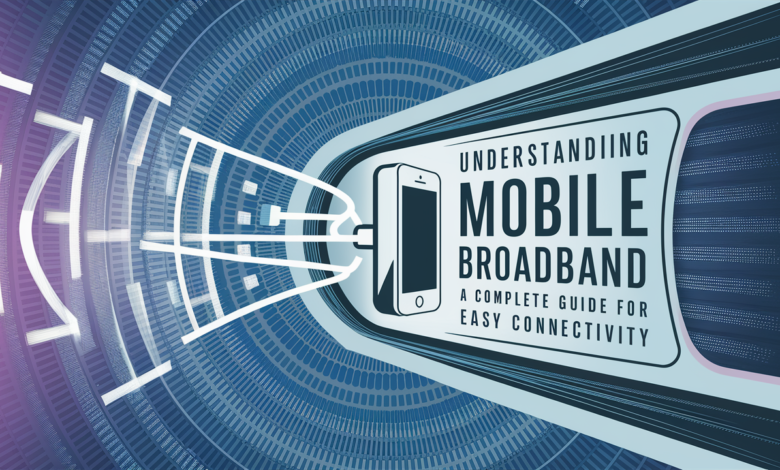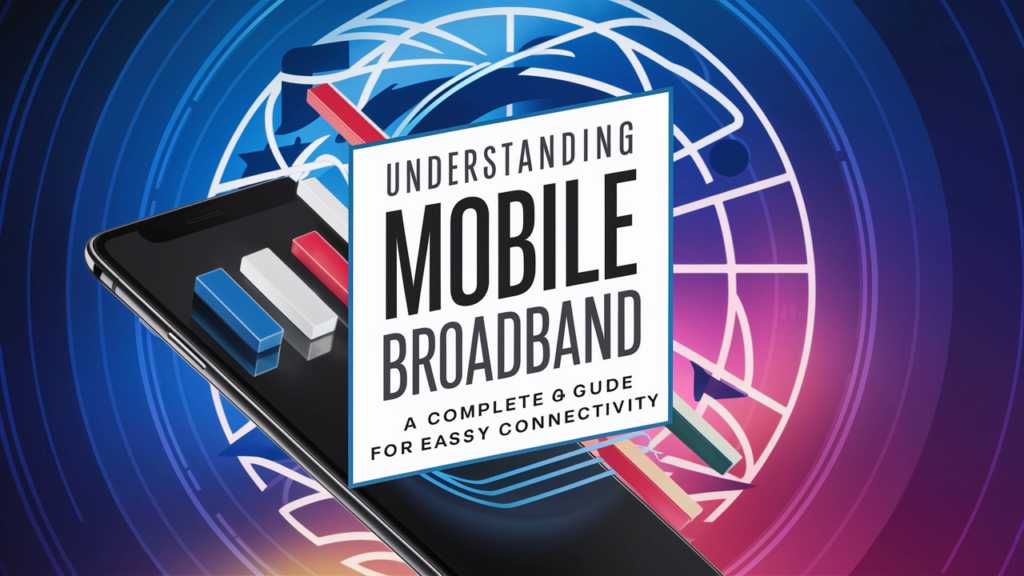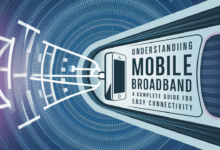Understanding Mobile Broadband: A Complete Guide for Easy Connectivity

Mobile broadband has become a game-changer in the way we access the internet today. Whether you’re at home, at work, or on the go, mobile broadband allows you to stay connected with ease, all through your mobile device. It’s an internet connection that you can take anywhere, giving you freedom and flexibility.
With mobile broadband, you can enjoy fast internet speeds, whether you’re streaming videos, working from home, or just browsing the web. It works by using cellular networks to provide a wireless internet connection, and it’s as simple as using your phone or a portable hotspot. The best part? You don’t need to rely on traditional fixed broadband services to enjoy a smooth internet experience.
Understanding Mobile Broadband: A Complete Guide for Easy Connectivity
Mobile broadband has become one of the most popular ways to access the internet today. It allows people to connect to the internet no matter where they are, whether at home, at work, or on the go. Mobile broadband is usually delivered through cellular networks, using mobile devices like smartphones, portable hotspots, or data-enabled tablets. These devices let you connect to the internet without needing a fixed line or cable.
In simple terms, mobile broadband works by using the cellular network of mobile providers to offer internet access. The data travels through the same towers that handle your phone calls and messages. The good thing about mobile broadband is that it’s flexible. You can access it from anywhere within the coverage area, unlike traditional fixed broadband, which requires you to stay in one location.
As technology keeps improving, mobile broadband speeds are getting faster, and the connection is becoming more reliable. Many people use it for various tasks, like streaming videos, checking social media, browsing websites, or even working from home. Its convenience and portability make it a great solution for people who don’t want to be tied to a home broadband connection.
Mobile broadband can be particularly helpful when traveling. With a portable hotspot device or a mobile-enabled tablet, you can keep your internet connection wherever you go. All you need is a reliable cellular signal, and you’re good to go! This kind of broadband is popular with digital nomads, business travelers, and students who need internet access while moving around.
What is Mobile Broadband and How Does It Work

Mobile broadband refers to internet access provided through wireless technology over a mobile network. It works by using cellular data networks to give you internet connectivity, similar to how your mobile phone connects to the network for calls and messages. With this system, instead of relying on fixed wires or cables, you can access the internet anywhere there’s mobile coverage.
Here’s how it works: Your mobile device or a dedicated mobile broadband device, like a portable hotspot, uses the cellular network to connect you to the internet. Your mobile network provider assigns you a data plan, which determines how much internet data you can use each month. Once you’re connected, you can browse the web, stream videos, download files, and use apps, just like you would with a home broadband connection.
Mobile broadband operates using three main types of technology: 3G, 4G, and the newest, 5G. The higher the generation of technology (like 5G), the faster and more reliable your connection can be. But even 4G can provide a decent internet speed for most everyday activities, such as browsing and streaming.
The speed and reliability of mobile broadband depend on various factors, including the strength of the network signal and how many people are using the network at the same time. While it’s great for most people, there may be some situations where the internet can slow down, especially in crowded areas or rural locations.
The Benefits of Mobile Broadband: Stay Connected Anywhere
Mobile broadband brings many advantages that make it an attractive choice for internet users. One of the biggest benefits is its portability. Unlike traditional broadband, which needs a fixed connection, mobile broadband can be used wherever you go. As long as you’re in an area with mobile coverage, you can connect to the internet instantly.
Flexibility and Convenience
With mobile broadband, you don’t need to be stuck in one place to get online. Whether you’re traveling, working in a coffee shop, or at a friend’s house, you can easily connect to the internet. The ability to take your broadband connection with you wherever you go is a huge advantage for people who are always on the move.
Cost-Effectiveness
For some people, mobile broadband can be more affordable than traditional broadband. Many mobile network providers offer flexible plans where you pay only for the data you use, without needing to commit to long-term contracts. This makes it a more budget-friendly option for those who don’t need a lot of data or a fixed-line connection.
Easy Setup
Setting up mobile broadband is simple. All you need is a compatible device and a data plan from a mobile provider. You won’t have to wait for installation appointments or worry about cables. It’s just plug and play – or rather, connect and go!
Great for Traveling
One of the top reasons people choose mobile broadband is because of its convenience when traveling. Whether you’re in a car, a train, or flying across the country, you can stay connected. This is particularly useful for business travelers, digital nomads, and anyone who spends time away from home.
Mobile Broadband vs. Traditional Internet: Which One Is Better for You?
When deciding whether to use mobile broadband or traditional internet, it’s essential to understand the differences. Mobile broadband offers the benefit of portability, while traditional broadband typically provides a more stable connection.
Mobile Broadband
- Portable and flexible
- Best for people on the go
- More suitable for short-term or temporary internet needs
- Less reliable in remote areas with poor mobile coverage
Traditional Broadband
- Usually more stable and reliable
- Better for heavy internet usage, like gaming or large file downloads
- Requires a fixed location and installation
- May come with long-term contracts or setup fees
Choosing between mobile broadband and traditional internet comes down to your specific needs. If you need flexibility and move around a lot, mobile broadband is a good option. However, if you spend most of your time in one place and require a fast, stable connection for activities like gaming or video conferencing, traditional broadband might be better.
How to Choose the Best Mobile Broadband Plan for Your Needs

When you decide to use mobile broadband, the next step is picking the best plan. Many different providers offer mobile broadband services, and each offers a variety of plans. It’s important to consider what you need and how much you’re willing to spend.
Factors to Consider:
- Data Allowance: How much data do you need each month? If you only use the internet for light browsing and social media, a plan with a smaller data allowance may work for you. If you stream a lot of videos or download large files, you’ll need a plan with a higher data limit.
- Network Coverage: Make sure the provider has good coverage in the areas where you live and travel. You can check the provider’s coverage maps online to ensure they have strong service in your area.
- Speed: The faster the connection, the better your internet experience will be. Look for providers that offer 4G or 5G speeds if you want a faster connection for streaming or working online.
- Contract Length: Some providers require long-term contracts, while others offer month-to-month plans. If you’re not sure how long you’ll need mobile broadband, consider choosing a flexible plan that lets you cancel or change your plan without penalties.
By taking all of these factors into account, you can select the best mobile broadband plan that fits your lifestyle and budget.
Conclusion
Mobile broadband offers a convenient and flexible way to stay connected to the internet wherever you are. It’s ideal for people who need to stay connected while traveling or for those who don’t want to commit to a long-term, fixed broadband contract. With the advancements in 4G and 5G technologies, mobile broadband speeds continue to improve, allowing users to stream videos, work remotely, and enjoy high-speed internet on the go.
While mobile broadband may not replace traditional broadband for everyone, it is an excellent option for many people who prioritize mobility and convenience. Whether you’re a business traveler, a student, or just someone who needs internet access wherever you go, mobile broadband can meet your needs. Just make sure to choose a plan that fits your data needs, coverage area, and speed requirements to get the best value for your money.
FAQs
Q: What is mobile broadband
A: Mobile broadband is a way to access the internet using a mobile network. It works by connecting your device to a cellular network, allowing you to browse the web and use online services from anywhere with coverage.
Q: Is mobile broadband faster than Wi-Fi
A: Mobile broadband can be fast, especially with 4G or 5G connections. However, traditional Wi-Fi from home broadband may offer faster speeds for heavy usage like streaming or gaming.
Q: Can I use mobile broadband anywhere
A: You can use mobile broadband anywhere there is cellular coverage. However, in remote areas with poor network signals, the connection may be slower or unavailable.
Q: How much data do I need for mobile broadband
A: The amount of data you need depends on your usage. Light browsing might only require a small amount, while heavy streaming and downloading will need more data.
Q: Is mobile broadband good for video calls
A: Yes, mobile broadband can be used for video calls. To ensure a smooth experience, choose a plan with enough data and good connection speeds.





